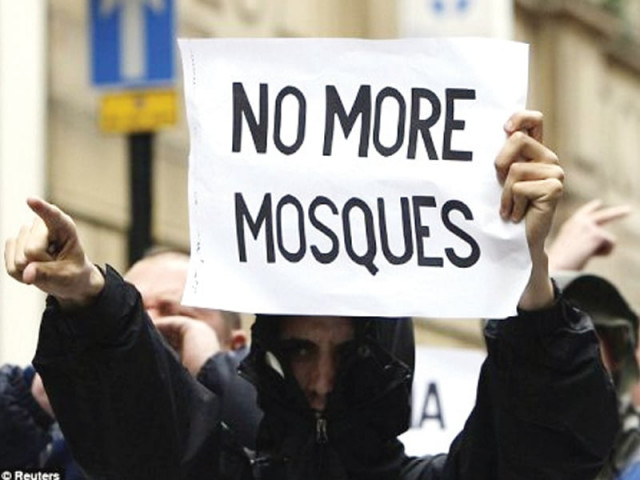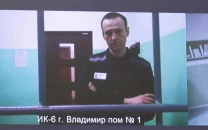Muslims in the Middle
“Muslim bombers off our streets!” Streams of young men pour out of dozens of buses and onto the streets of Luton.

Muslims in the Middle
In the biggest demonstration ever held by the right wing group the English Defence League (EDL) on February 5, some 3,000 supporters have come — not just from around the country, but from around Europe — in a show of strength for EDL’s programme of resisting what it calls the ‘Islamification’ of the country.
On the fringes of the demonstration stand ‘ordinary’ people, reluctant to be openly identified with the hooligans that form a bulk of EDL activists, but nevertheless sympathetic to their message. “They shouldn’t have spat on the soldiers,” says one such woman. “It wasn’t their fault they’d been sent to fight in a war.”
“They” are a small group of Islamic extremists called Al-Muhajiroun who, almost two years ago in Luton, cursed and spat on British soldiers returning from Iraq. This incident was the catalyst for the formation of the EDL and the group’s outrageous opinions and antics continue to invite disproportionate media coverage and help swell its ranks. In the minds of increasing numbers of non-Muslims, the 20 or so Al-Muhajiroun extremists represent Muslims in Britain today.
Out of Britain’s estimated 2.8 million Muslims, 1.2 million trace their origins to Pakistan. While London has a mix of Pakistanis from all provinces, elsewhere in Britain most of the Pakistanis are from Azad Kashmir. Birmingham, Leicester, Bradford and Luton, all contain sizeable populations of Pakistanis of Kashmiri origin.
These are the communities in which the outward expression of religious identity has been on the rise since 9/11. According to Dr Fiaz, spokesperson for the Luton Council of Mosques, there is much confusion amongst Pakistan origin youth about their identity. “Youngsters of the second or third generation have little or no connection with Pakistan,” he explains. “By overtly being Muslim they know who they are.”
The adoption of a religious identity often reflects the profound social conservatism of these communities. Shemiza Rashid, founder of the Creative Muslim Network in Luton is unusual in the community as an observant Muslim woman who does not wear a headscarf. “I’m sometimes surprised when I meet women who come from Pakistan,” she says. “They wear clothes that many of us here wouldn’t wear.”
For some, the outward expression of Muslimness is a form of rebellion or protest against a monolithic notion of British identity, explains Ziauddin Sardar, a scholar who has written extensively on Islam and the British Muslim experience. The minority and the host are caught in a vicious circle; the more the host stereotypes Muslims and sees them only in terms of their religious identity the more the minority asserts that identity in protest.
And stereotypes abound amongst the EDL crowds. “They’re forcing our children to eat halal meat!” says one protester, repeating a story that has been proved false in the press. “And do you know how they slaughter their animals? It’s cruel and disgusting.”
Some carry placards proclaim that women are oppressed under Shariah while others denounce Muslims as paedophiles. In the mainstream media, any wrong committed by a Muslim is invariably linked to his religion.
“Both within the community and outside there is a tremendous focus on religion as the primary identity,” says Cassandra Balchin, a freelance researcher who has been part of the Women Living Under Muslim Laws network for fifteen years.
The increasing visibility of Muslims, the perceived terrorist threat they pose, plus the ranting of a fanatic minority are fueling the fears of the British majority. “I don’t want my children growing up in an Islamic state,” said EDL’s leader Stephen Lennon in a recent TV interview. This irrational fear is being voiced in many European countries and could garner more popularity in an economic climate of job losses and welfare cuts.
The trend towards religiosity that has accompanied the search for identity has had many positive results that are rarely mentioned. Much of the grassroots work done at the community level, with young people, women and schoolchildren is motivated by religion.
One such example is Mohsin Malick who, under a programme called Building Brighter Futures, conducts workshops focusing on de-glamorising drugs and crime for young men of Pakistani origin in Luton. “The workshops are about giving them a deeper understanding of their religion that’s more than just ritualistic,” he says. “I try to give them confidence in who they are.”
Some argue that while religion may be improving individual lives the upsurge in religious conservatism is hampering integration. While Malick believes that more needs to be done to encourage integration, he does not think that religion is a barrier. “The majority of people who come to faith become better people — they aren’t still peddling drugs or stealing cars or stitching up people — they leave that behind” he says.
Tehmina Riaz works for British Muslims for Secular Democracy, an organisation that aims to combat both Islamophobia and religious extremism. “Greater religiosity is sadly leading us towards separatism,” she says. “There are plenty of people who do a great job of straddling their different identities but there is a fringe of people who are resisting it and this increases support for groups such as EDL”.
How religious conservatism creates a barrier to integration was revealed only too clearly in a recent documentary on British TV (Despatches Channel 4 February 14th). Secret cameras hidden in a Darul Uloom in Birmingham, which had assured government inspectors that it taught tolerance and respect for other faiths, revealed a different and depressing story. Students were being taught hatred not only for non-Muslims (“the infidels are the worst sort of people”) but also for moderate Muslims (“any man with less than a fistful of beard should be avoided like a snake or serpent”). This was accompanied by routine hitting of children.
As a minority that often feels besieged, British Muslims are reluctant to openly discuss such issues. The only family the documentary producers could find ready to comment kept their faces hidden from the camera. “They don’t have the confidence to speak out,” says Cassandra Balchin “It is seen somehow as washing dirty laundry in public.”
Dr Fiaz identifies the problem as one of leadership. “If someone is looking for religious knowledge who will give it, some Imam or a sheikh somewhere? We’re not mature enough as a community to guide our youngsters.” He admits that in certain mosques he ‘could be sitting in Pakistan’.
“There is a tendency to divide the world up into ‘kufar’ and ‘brothers’,” says Hasan Nasiri of the Islamic Society of Britain. “And we are trying to fight this within the community.”
As the EDL gathered in Luton’s town centre, in the predominantly Muslim area of Bury Park, hundreds of British Pakistani men thronged the streets ready to protect their homes, shops and mosques from a possible attack. Some young men in balaclavas may have been itching for a fight but, with the help of local mosques and youth groups, the day passed peacefully.
Proud of the way they had handled the day, British Pakistanis were in for a disappointment. Instead of condemning the EDL, Prime Minister David Cameron had chosen the same day to pinpoint Muslims as a ‘problem’. At a security conference in Munich, Cameron declared his government would henceforth target all ‘extremism’ and work only with Muslim groups that promote ‘British values’.
The speech highlighted the essential problem with which British Muslims appear to be grappling. What does it mean to be British and what are British values?
Cameron defined these values as freedom of speech and religion and equal rights. While these may be the values the government legitimately seeks to promote, many argue that there is no consensus over what British values are.
“Being British to me is playing an active role in civic society,” says Mohsin Malick, “And in this respect Muslims are more British than David Cameron.” Others talk of justice and fairplay, the rule of law, the Queen and even fish and chips as elements of Britishness.
For EDL and its sympathisers Muslims represent all that is not British. “If they hate it so much here,” says one EDL activist, “why don’t they just go home?” The young men on the streets of Bury Park are very clear about where home is. “I can’t get any more British than I already am without giving up my faith,” says one young man.
Many European countries are struggling to cope with changing notions of national identity that growing Muslim populations are forcing on them. Ziauddin Sardar is confident that in Britain these conflicts will be resolved in a rational way. “Britain is a very open society and its strength is that things are allowed to work out,” he says. “Britishness will have to include Muslimness. It is just a matter of time.”
Published in The Express Tribune, Sunday Magazine, April 10th, 2011.



















COMMENTS
Comments are moderated and generally will be posted if they are on-topic and not abusive.
For more information, please see our Comments FAQ